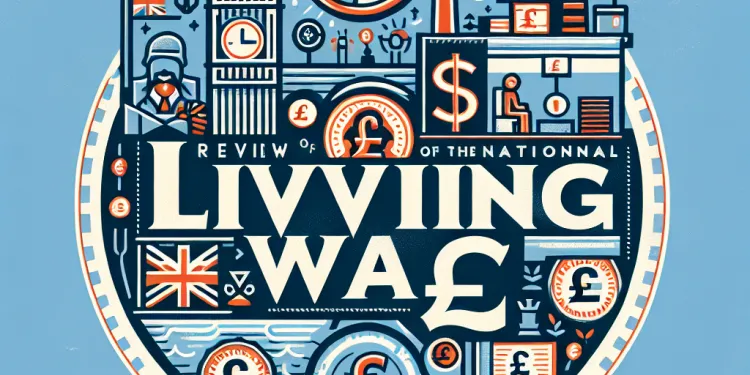
Find Help
More Items From Ergsy search
-

How does the UK National Living Wage compare internationally?
Relevance: 100%
-

Who is eligible for the National Living Wage?
Relevance: 85%
-

Is the Living Wage Foundation's rate the same as the National Living Wage?
Relevance: 81%
-

UK national living wage increase 2026
Relevance: 80%
-

Why is the National Living Wage being increased?
Relevance: 79%
-

How does the National Living Wage differ from the National Minimum Wage?
Relevance: 79%
-

How is the National Living Wage calculated?
Relevance: 79%
-

Are apprentices entitled to the National Living Wage?
Relevance: 78%
-

What is the new UK National Living Wage for 2026?
Relevance: 76%
-

How often is the National Living Wage reviewed?
Relevance: 76%
-

Will the increase in the National Living Wage affect inflation?
Relevance: 75%
-

Are employers legally required to pay the National Living Wage?
Relevance: 73%
-

Are zero-hour contract workers entitled to the National Living Wage?
Relevance: 73%
-

Where can I find official announcements on the National Living Wage?
Relevance: 71%
-

What happens if an employer pays below the National Living Wage?
Relevance: 68%
-

How can I calculate my new earnings based on the National Living Wage increase?
Relevance: 67%
-

How often do wage rates change in the UK?
Relevance: 52%
-

Does the National Living Wage increase mean my taxes will change?
Relevance: 49%
-

Can international applicants apply for jobs at the National Trust?
Relevance: 48%
-

When will the new National Living Wage come into effect?
Relevance: 35%
-

Does the National Trust offer internships?
Relevance: 32%
-

Do gig workers have the right to a minimum wage?
Relevance: 32%
-

Will the digital license be accepted internationally?
Relevance: 32%
-

Can my wages be garnished for unpaid student loans?
Relevance: 32%
-

What should I do if my employer does not pay the new National Living Wage?
Relevance: 31%
-

How does the National Living Wage increase impact small businesses?
Relevance: 31%
-

Does the Attorney General have a role in international law?
Relevance: 31%
-

Is there any international interest in Australia's social media ban?
Relevance: 30%
-

Do international students need the meningitis vaccine?
Relevance: 29%
-

What are National Trust Jobs?
Relevance: 28%
-

What is the National Trust?
Relevance: 28%
-

Are there seasonal jobs with the National Trust?
Relevance: 28%
-

Has the US ever left an international organization like WHO before?
Relevance: 27%
-

Can I receive the payment if I live abroad?
Relevance: 27%
-

Does scabies affect internal organs?
Relevance: 27%
-

Do international students qualify for the £500 payment?
Relevance: 27%
-

Do National Trust jobs require travel?
Relevance: 27%
-

Do I need to pay tax on the £500 cost of living payment?
Relevance: 27%
-

Can I become an NHS nurse if I have international nursing qualifications?
Relevance: 26%
-

Can I get a job with the National Trust if I am a student?
Relevance: 26%
Introduction
The UK National Living Wage is a critical component of the country's labor market, designed to ensure a minimum standard of living for workers aged 23 and over. It sets a baseline hourly wage that employers must pay, with the aim of improving living conditions and reducing poverty. However, understanding how the UK National Living Wage stacks up against international counterparts can provide insight into its effectiveness and competitiveness in the global market.
The UK's Position
As of April 2023, the National Living Wage in the UK was set at £10.42 per hour. This rate is subject to change annually, aiming to meet the intended target of reaching 66% of median earnings by 2024. The UK government sets this standard to protect vulnerable low-paid workers and to progressively increase workers' remuneration without having detrimental effects on employment levels.
Comparison with Other European Countries
In comparison to other European nations, the UK's living wage finds itself in a middle-ground position. For instance, countries like Luxembourg and Ireland offer higher minimum wages, with Luxembourg leading the EU with a monthly minimum wage exceeding €2,200, equating to over £11.50 per hour. Ireland follows closely, offering nearly €11.30 per hour. In contrast, several Eastern European countries have lower minimum wage levels, reflective of different economic circumstances and cost of living.
Germany offers a comparable minimum wage, with rates set at €12 per hour (approximately £10.30), slightly below the UK rate. Nevertheless, differences in living costs between regions must also be considered when making direct comparisons between countries.
The Global Perspective
When broadening the scope to a global view, the UK National Living Wage ranks lower than several developed countries outside Europe. For example, Australia and New Zealand have long been recognized for their high minimum wage standards. As of 2023, Australia's federal minimum wage stands at AUD 21.38 per hour, which is approximately £11.20, while New Zealand offers NZD 21.20, about £10.90. The United States, on the other hand, maintains a federal minimum wage of $7.25, roughly £5.90, highlighting a significant regional variance within statewide mandates that exceed this amount.
Economic and Social Implications
Implementing a competitive living wage in the UK seeks to bridge the income gap and elevate living standards, impacting economic equality and productivity. By maintaining a capable and motivated workforce, the UK aims to drive economic growth whilst ensuring workers can meet basic living costs. However, discrepancies in international living wage levels are also indicative of differing labor market strategies and socioeconomic policies. Each country balances economic growth, employment, and social welfare uniquely.
Conclusion
In conclusion, the UK National Living Wage is reasonably competitive within Europe, aligning itself with major economies, yet it falls short against high-paying regions globally like Australia and New Zealand. Understanding these international dynamics is essential for evaluating policy effectiveness, meeting international benchmarks, and striving toward improvements in living standards.
Introduction
The UK National Living Wage is the lowest amount of money employers must pay workers aged 23 and over. It helps ensure workers earn enough to live on. This wage is important to reduce poverty and improve how people live. Comparing the UK wage with other countries can help us see how good it is.
The UK's Position
In April 2023, the National Living Wage in the UK was £10.42 per hour. This amount can change each year. By 2024, the UK wants the wage to be about two-thirds of what most people earn. This helps protect workers who get paid less and aims to increase their pay without causing job loss.
Comparison with Other European Countries
The UK wage is in the middle when compared to other European countries. Luxembourg and Ireland have higher wages. In Luxembourg, the minimum wage is over £11.50 per hour. Ireland pays nearly £11.30. Eastern European countries often have lower wages due to different costs of living. Germany’s wage is close to the UK's at about £10.30 per hour. Different living costs in each country can affect how these wages compare.
The Global Perspective
Looking around the world, the UK wage is lower than some places like Australia and New Zealand. In 2023, Australia's wage was about £11.20 per hour, and New Zealand's was about £10.90 per hour. The United States has a lower wage of about £5.90 per hour, though some states pay more than this.
Economic and Social Implications
The UK wants its living wage to help close the gap between rich and poor and improve living standards. This can help the economy grow and ensure workers earn enough to cover basic living costs. Different countries have their own ways to balance the economy and worker welfare.
Conclusion
In conclusion, the UK National Living Wage competes well in Europe but is lower than some places like Australia and New Zealand. Understanding these differences can help improve living standards and economic policies.
Frequently Asked Questions
What is the UK National Living Wage?
The UK National Living Wage (NLW) is a statutory minimum wage rate for workers aged 23 and over, set by the UK government.
How does the UK National Living Wage compare to the US federal minimum wage?
The UK National Living Wage is generally higher than the US federal minimum wage, although individual US states may have higher state-specific minimum wages.
How is the UK National Living Wage determined?
The UK National Living Wage is determined by the UK government, based on recommendations from the Low Pay Commission, which considers factors like economic conditions and cost of living.
Is the UK National Living Wage considered high compared to other European countries?
The UK National Living Wage is relatively competitive and higher than the minimum wages in several other European countries, though it may still be lower than countries like Luxembourg and Ireland.
Which country has the highest minimum wage in the world?
Australia is often cited as having one of the highest minimum wages in the world.
How does the UK National Living Wage affect workers under 23?
Workers under 23 receive a lower minimum wage rate in the UK, which is called the National Minimum Wage, with different rates for specific age groups.
Does the UK National Living Wage apply to all workers in the UK?
The UK National Living Wage applies to most workers aged 23 and over; some exceptions include apprentices, interns, and voluntary workers.
How often is the UK National Living Wage reviewed?
The UK National Living Wage is typically reviewed annually, with changes announced in the budget or other governmental statements.
What factors influence changes in the UK National Living Wage?
Factors include inflation, cost of living, productivity, and the overall economic conditions in the UK.
Are there any countries with no statutory minimum wage?
Yes, countries like Switzerland and Sweden do not have a statutory minimum wage but rely on collective bargaining agreements within industries.
How does the UK's minimum wage compare to Canada's?
Minimum wage rates in Canada vary by province, some of which have rates that are comparable to or higher than the UK's National Living Wage.
Is the minimum wage enough to live on in the UK?
While the UK National Living Wage aims to cover basic living costs, debates continue on whether it is sufficient, with some advocating for a higher 'real living wage.'
Are small businesses in the UK affected differently by the National Living Wage?
Small businesses may face more significant financial pressures from increases in the National Living Wage compared to larger companies.
What is the difference between the UK National Living Wage and the Real Living Wage?
The National Living Wage is a legal requirement, while the Real Living Wage is higher and voluntary, guided by the Living Wage Foundation to reflect actual living costs.
Which European country has the highest minimum wage?
Luxembourg is known to have the highest minimum wage in Europe.
Has Brexit affected the UK's National Living Wage?
Brexit's direct impact on the National Living Wage is unclear, though economic changes following Brexit could influence future wage policies.
What is the current rate of the UK National Living Wage?
The rate is periodically updated by the government; users should check official resources for the latest figures.
Do all high-income countries have higher minimum wages than the UK?
Not all high-income countries have higher minimum wages; it varies based on local economic conditions and cost of living.
How is compliance with the National Living Wage enforced in the UK?
The UK government enforces compliance through HM Revenue and Customs, which can investigate and penalize non-compliant employers.
Does the UK National Living Wage include benefits and bonuses?
The National Living Wage pertains to basic pay and does not typically include benefits or bonuses.
What is the UK National Living Wage?
The UK National Living Wage is the lowest money a worker can be paid in the UK for one hour of work if they are at least 23 years old. It helps make sure people earn enough money to live.
If you find reading hard, you can ask a friend or family member to help you understand. You can also use tools that read the text out loud for you.
The UK National Living Wage (NLW) is the lowest amount of money you must get paid if you are 23 years old or older and working. The UK government decides this amount.
How do wages in the UK and US compare?
The UK has a rule for minimum pay called the National Living Wage. The US has a rule called the federal minimum wage.
The UK National Living Wage is the lowest amount most workers in the UK must get paid. The US federal minimum wage is the lowest amount most workers in the US must get paid.
To understand and compare these wages, you can:
- Use a calculator to convert money from pounds (UK) to dollars (US).
- Look on websites for the latest wage rates in both countries.
- Ask an adult or teacher for help if you find it tricky.
The UK's National Living Wage is usually more money than the US federal minimum wage. But some states in the US might have their own minimum wages that are higher.
How do we decide the UK's National Living Wage?
The National Living Wage is the lowest money workers get for their work by law. It's like a promise to make sure people get paid fairly.
Every year, a group of smart people looks at how much food, clothes, and other things cost. They also think about how much money businesses can pay.
They tell the government what the new number should be. Then, the government sets the rule for everyone to follow.
Helpful Tip: You can use a calculator to help you understand how much money you'll earn with the National Living Wage.
The UK National Living Wage is the amount of money people must be paid by law. The UK government decides this amount. They get advice from a group called the Low Pay Commission. This group looks at how much things cost and how the economy is doing.
Is the UK National Living Wage high compared to other European countries?
The National Living Wage is the money people in the UK get paid for working.
Let's compare this to other European countries.
Tools that can help you understand:
- A simple chart to see the wages in different countries.
- Use a globe or map to find Europe.
Ask someone if you need help with this.
The UK National Living Wage pays workers a good amount compared to some other countries in Europe. It is more money than what some countries pay. But, countries like Luxembourg and Ireland might pay more.
What country pays the most money for the lowest jobs?
This question asks about which country gives the most money to workers in jobs that pay the least. A minimum wage is the smallest amount of money people can be paid for their work. Look at different countries to find out which one pays the most. You can use a map or ask a teacher or a helper for more information.
Australia gives workers one of the best pay rates in the world.
What does the UK National Living Wage mean for workers under 23?
The UK has a money rule called the National Living Wage. This is to make sure people get paid enough for their work.
If you are under 23 years old, this rule explains how much money you should get for doing your job.
It is a bit different for people who are 23 years old or older. They may get more money.
Using tools like a calculator can help you see how much you should get paid.
In the UK, people who are under 23 years old get paid less than older workers. This is called the National Minimum Wage, and there are different pay rates for different ages.
Does everyone in the UK get the National Living Wage?
Not everyone in the UK gets the National Living Wage. It is for people who are 23 years old and older. Younger workers might get less money. Some people, like students or people who work on jobs for training, might also get less.
If you want help to understand this, you can:
- Ask a friend or family member to explain.
- Use tools like Read&Write software to help read and understand.
- Check the UK government's website for more details.
In the UK, people aged 23 and older usually get a set pay called the National Living Wage. But there are some exceptions. For example, apprentices, interns, and people who do volunteer work might not get this pay.
How often do they check the UK National Living Wage?
The UK National Living Wage is checked every year. Changes to it are usually announced in the budget or in statements from the government.
Here are some tips to help understand this:
- Look for announcements about the budget or government updates to know about changes.
- If you find it hard to read, ask someone to read it with you.
- Use online tools that read text out loud.
What makes the UK National Living Wage change?
The UK National Living Wage can go up or down. Here are some reasons:
- Prices: If things cost more money, the wage might go up.
- Government decisions: Leaders might choose to change the wage.
- Economy: If the country's money situation changes, the wage might change too.
- Experts: People who study money and jobs might give advice on what the wage should be.
Here are some tools that can help:
- Picture cards: Use cards with pictures and words to understand better.
- Talking tools: Listen to someone explain the information out loud.
There are things that can affect prices and money in the UK. These are:
- When prices go up, which is called inflation.
- How much money people need to live, called the cost of living.
- How hard people are working, which is called productivity.
- How well the UK is doing with money, called economic conditions.
Here are some tips to help you understand:
- Use simple words when you talk about money stuff.
- Read in a quiet place so you can focus better.
- Ask someone to explain if you find it hard.
- Use pictures or videos to help understand big ideas.
Do some countries have no set lowest pay?
Some countries do not have a law that says the lowest amount of money a person must be paid for their work. To make it easier to understand, you can: - Use pictures or symbols to help explain ideas. - Break information into small, simple parts. - Use tools like text-to-speech to hear the information.Yes, some countries like Switzerland and Sweden do not have a set minimum pay for everyone. Instead, workers and companies in different jobs talk and agree on how much workers should be paid.
How does the UK's minimum wage compare to Canada's?
The minimum wage is the smallest amount of money someone can be paid for their work.
This question asks us to look at how the minimum wage in the UK (United Kingdom) is different from the minimum wage in Canada.
Here are some tips to help you understand:
- Check the numbers: Look up how much the minimum wage is in both countries.
- Use a calculator: It can help you compare the numbers easily.
- Ask for help: You can talk to a teacher or friend if you need more information.
- Look at charts: Sometimes, charts and graphs can make it easier to see the differences.
The lowest amount of money you can get paid in Canada is different in each part of the country. Some parts pay as much or more than the UK's National Living Wage.
Can people live on the minimum wage in the UK?
In the UK, some people get paid the minimum wage. This is the smallest amount of money they can earn for working.
We need to know if this money is enough for them to buy things they need, like food, clothes, and a place to live.
If you find reading hard, you can use tools that read the words aloud. You can also ask someone to explain it to you or write down keywords to help you understand.
The UK National Living Wage is the amount of money some people earn for work. It is meant to help them pay for things they need to live. But some people think this amount is not enough. They say we should have a higher 'real living wage' so people can cover all their basic needs.
Do small businesses in the UK feel the National Living Wage in a different way?
Small businesses might find it harder to pay for things if the National Living Wage goes up. This could be tougher for them than for big companies.
What is the difference between the UK National Living Wage and the Real Living Wage?
The UK National Living Wage is the lowest amount of money workers must be paid by law if they are over 23.
The Real Living Wage is a higher pay. It is not required by law but some employers choose to pay it. It is based on what people need to live and covers costs like food, rent, and bills.
Helpful tips for understanding wages:
- Use pictures to show how wages work.
- Ask someone to explain it with simple words.
- Watch videos about wages for a clear picture.
The National Living Wage is the law. Companies have to pay it.
The Real Living Wage is more money than the National Living Wage. It is not the law, but some companies choose to pay it because it helps people with real living costs. It is suggested by the Living Wage Foundation.
Which country in Europe pays the most money for the lowest job?
Luxembourg has the highest minimum wage in Europe. This means people working in Luxembourg get paid more money than in other European countries.
Has Brexit changed the UK's National Living Wage?
Brexit means the UK left the European Union.
The National Living Wage is the money workers are paid.
We want to know if Brexit changed how much money workers get.
Tools like picture charts can help you understand.
We don't know exactly how Brexit will change the National Living Wage. However, Brexit can change the economy, and this might affect future wage decisions.
What is the UK National Living Wage now?
The UK National Living Wage is the money people over 23 years old must get for working.
To find out the current amount: 1. You can check the government website. 2. You can ask at a local library for help.
The government changes the rate from time to time. People should look at official websites to find the most recent numbers.
Do rich countries pay more money per hour than the UK?
This means, do people in rich countries earn more money per hour than people in the UK?
If you find reading hard, you can ask someone to help you read.
Not every country with a lot of money has high minimum wages. The amount of money people earn can change depending on how much things cost in that place and how the local economy is doing.
How do people make sure everyone gets the National Living Wage in the UK?
The National Living Wage is the minimum money you must get paid for your work in the UK.
Here is how people check that workers get the right pay:
- Checking Pay: There are special workers who look at how much workers are paid. They make sure it is the right amount.
- Report a Problem: If you think you are not getting enough money, you can tell someone. This can help fix the problem.
- Help for Workers: Some groups can help you understand your money rights. They can also help if there is a problem with your pay.
Here are some tools that can help:
- Pay Calculator: You can use a special calculator to check if your pay is correct.
- Talk to Someone: You can talk to someone at work or in a support group if you have questions.
The UK government makes sure people follow the rules. They do this through a group called HM Revenue and Customs. This group can check if bosses are not following the rules and can give them a fine if needed.
Does the UK National Living Wage include benefits and bonuses?
The UK National Living Wage is pay for work. It is the money you get before any extra things.
The National Living Wage does not include benefits. Benefits are extra help like money for rent or childcare. It also does not include bonuses. Bonuses are extra money you might get for working hard.
If you need help understanding money words, try asking someone you trust. You can also use a calculator when you work with money.
The National Living Wage is the main money you are paid for work. It usually doesn't include extra money like benefits or bonuses.
Useful Links
Have you found an error, or do you have a link or some information you would like to share? Please let us know using the form below.
-->
This website offers general information and is not a substitute for professional advice.
Always seek guidance from qualified professionals.
If you have any medical concerns or need urgent help, contact a healthcare professional or emergency services immediately.
Some of this content was generated with AI assistance. We’ve done our best to keep it accurate, helpful, and human-friendly.
- Ergsy carfully checks the information in the videos we provide here.
- Videos shown by Youtube after a video has completed, have NOT been reviewed by ERGSY.
- To view, click the arrow in centre of video.
- Most of the videos you find here will have subtitles and/or closed captions available.
- You may need to turn these on, and choose your preferred language.
- Go to the video you'd like to watch.
- If closed captions (CC) are available, settings will be visible on the bottom right of the video player.
- To turn on Captions, click settings .
- To turn off Captions, click settings again.
More Items From Ergsy search
-

How does the UK National Living Wage compare internationally?
Relevance: 100%
-

Who is eligible for the National Living Wage?
Relevance: 85%
-

Is the Living Wage Foundation's rate the same as the National Living Wage?
Relevance: 81%
-

UK national living wage increase 2026
Relevance: 80%
-

Why is the National Living Wage being increased?
Relevance: 79%
-

How does the National Living Wage differ from the National Minimum Wage?
Relevance: 79%
-

How is the National Living Wage calculated?
Relevance: 79%
-

Are apprentices entitled to the National Living Wage?
Relevance: 78%
-

What is the new UK National Living Wage for 2026?
Relevance: 76%
-

How often is the National Living Wage reviewed?
Relevance: 76%
-

Will the increase in the National Living Wage affect inflation?
Relevance: 75%
-

Are employers legally required to pay the National Living Wage?
Relevance: 73%
-

Are zero-hour contract workers entitled to the National Living Wage?
Relevance: 73%
-

Where can I find official announcements on the National Living Wage?
Relevance: 71%
-

What happens if an employer pays below the National Living Wage?
Relevance: 68%
-

How can I calculate my new earnings based on the National Living Wage increase?
Relevance: 67%
-

How often do wage rates change in the UK?
Relevance: 52%
-

Does the National Living Wage increase mean my taxes will change?
Relevance: 49%
-

Can international applicants apply for jobs at the National Trust?
Relevance: 48%
-

When will the new National Living Wage come into effect?
Relevance: 35%
-

Does the National Trust offer internships?
Relevance: 32%
-

Do gig workers have the right to a minimum wage?
Relevance: 32%
-

Will the digital license be accepted internationally?
Relevance: 32%
-

Can my wages be garnished for unpaid student loans?
Relevance: 32%
-

What should I do if my employer does not pay the new National Living Wage?
Relevance: 31%
-

How does the National Living Wage increase impact small businesses?
Relevance: 31%
-

Does the Attorney General have a role in international law?
Relevance: 31%
-

Is there any international interest in Australia's social media ban?
Relevance: 30%
-

Do international students need the meningitis vaccine?
Relevance: 29%
-

What are National Trust Jobs?
Relevance: 28%
-

What is the National Trust?
Relevance: 28%
-

Are there seasonal jobs with the National Trust?
Relevance: 28%
-

Has the US ever left an international organization like WHO before?
Relevance: 27%
-

Can I receive the payment if I live abroad?
Relevance: 27%
-

Does scabies affect internal organs?
Relevance: 27%
-

Do international students qualify for the £500 payment?
Relevance: 27%
-

Do National Trust jobs require travel?
Relevance: 27%
-

Do I need to pay tax on the £500 cost of living payment?
Relevance: 27%
-

Can I become an NHS nurse if I have international nursing qualifications?
Relevance: 26%
-

Can I get a job with the National Trust if I am a student?
Relevance: 26%


